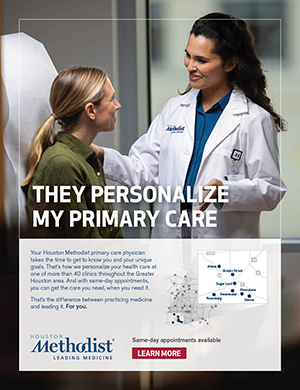Posted on Nov 25, 2025 in
NEWSWORTHY

As flu season ramps up, Dr. Tiyashi Choudhury, a board-certified primary care physician at Houston Methodist Sugar Land Hospital, is available to answer questions about the flu, including symptoms, vaccinations and how to keep oneself and others safe.
There are several types of flu vaccines available:
- Standard flu shot: The most common. Contains inactivated virus or virus parts and is safe for most people.
- FluMist (nasal spray): A live attenuated vaccine approved for people ages 2 to 49 who are not pregnant, immunocompromised or affected by certain conditions such as asthma or a cerebrospinal fluid leak.
- High-dose or adjuvanted vaccines: Recommended for people age 65 and older to help boost immune response and increase effectiveness in this population since our immune systems weaken as we age.
- Egg-free vaccine options are available for those with egg allergies.
The best approach is to talk to your doctor about your age, health status and any allergies to determine the best option.
Question: How severe is this year’s flu season compared to previous years, and what should people be thinking about it as we enter flu season?

Dr. Tiyashi Choudhury
Dr. Choudhury:
While it is too early to tell how severe the flu season for 2025-2026 will be, the previous flu season for 2024-2025 was one of the most severe seasons we have had in over 15 years. The case number along with hospitalizations were the highest since the 2010-2011 year. Flu starts to ramp up around mid-November to early March so there is still time to take precautions for this upcoming year with the flu vaccination. While the vaccination may not prevent the flu, it will significantly reduce the severity and also prevent hospitalizations in our high-risk population.
Question: What are the biggest myths about the flu and the flu vaccine?
Dr. Choudhury:
The most common myth is that the flu shot can give you the flu. The vaccine contains a piece of the virus but not the whole virus. Some people might experience some soreness of the arm or some mild symptoms, which is due to the immune system building up immunity, but it will not cause the full-blown symptoms. The nasal spray is a live vaccination so that may cause some more symptoms but still nowhere near the flu.
Another common myth is that the influenza vaccine does not work. The WHO and CDC are monitoring flu activity throughout the year. They will pick 3-4 strains that appear to be most rampant and create a vaccination based off the strain. The vaccination is purified and carefully tested for safety and mixed into the final vaccine formula which is dispensed to your doctor’s office and pharmacies. Overall, if there is a good match to the seasonal strain, the efficacy can be around 70-90%.
Question: Can healthy young people skip the flu shot since they’re not high risk?
Dr. Choudhury:
While it is true that a high-risk population will benefit from the flu vaccination, healthy young people will still benefit from the vaccination. Influenza can still cause severe illness in healthy people and vaccination helps prevent severity but also protection for those around.
Question: What’s new or different about this year’s flu vaccines? And how should people choose the right one?
Dr. Choudhury:
The flu vaccine this year has protection against 3 strains of the flu (two types of influenza A and one type of influenza B). Normally there are two strains of influenza B, but it appears that there has been one strain of influenza B which is no longer found.
Depending on your age, you will be given an age-appropriate dosage. There is the standard flu vaccination, FluMist (which is a nasal spray) and the high dose flu vaccination. The nasal spray is a live vaccination meaning that it may not be the right choice for certain patients who are pregnant or immunocompromised. Some of the vaccinations are made with egg components so there are also egg-free vaccine options available.
Question: How can people tell the difference between flu, COVID-19 and RSV?
Dr. Choudhury:
All three illnesses have very similar symptoms and sometimes the only way to tell them apart is by testing. There are times where these viruses can also infect a person at the same time. The common symptoms of the flu can be sudden and are usually seen with fever and body aches. It is helpful to be tested for flu because in the first few days, there are anti-viral options to help with decreasing the duration of the flu. COVID can mimic the flu but there are also other symptoms such as sore throat, coughing and sneezing. With COVID, there are certain groups who would benefit from anti-virals so it is important to also test. RSV is normally seen more severe in children and older adults but can be also seen in healthy adults. It is usually associated with a wet cough along with nasal congestion and wheezing.
Question: How can families protect vulnerable members during flu season?
Dr. Choudhury:
Vaccinations are the best protection because while it can help the individual person, it can also create a protective bubble around high-risk members. Other safeguards include regularly disinfecting high volume items such as phones, doorknobs and countertops are helpful, especially if someone is sick. Frequent hand washing with soap and water can prevent spreading viruses along with covering your mouth with sneezing/coughing.
Question: Any final thoughts or advice on flu season?
Dr. Choudhury:
Because of the unpredictable nature of the influenza virus and how bad a flu season can be, it is important to be able to use predictable tools such as vaccination, hand washing and masking to help protect yourself and others from being sick during the holiday and winter season. While it may not be fool proof, it is still helpful and will help ensure that you and your loved ones are able to enjoy a healthy holiday season!
More information related to the flu and flu season is available via Houston Methodist’s On Health Blog.
For more information about Houston Methodist, visit our On Health and Leading Medicine blogs.









